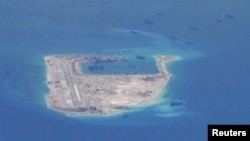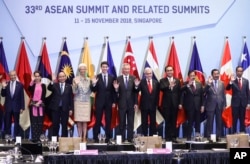Vietnam’s tough stance against China over sovereignty of the South China Sea will put Beijing on the defensive during regional talks on easing the regional maritime dispute, people who follow the process say.
Officials in Hanoi have suggested establishing a code of conduct that, among other things, would bar construction on artificial islands in the South China Sea and ban militarizing disputed features, said Carl Thayer, a University of New South Wales emeritus professor, in an online commentary about a preview of a draft code text written last year. Vietnam, he added, wants to ban any blockades of vessels and nix the possibility of any single country’s air defense identification zone.
Vietnam also would deem “unacceptable” any agreement excluding the sea’s Paracel Islands, which it claims but China effectively controls, according to a report posted by Gregory Poling, director of the Asia Maritime Transparency Initiative think tank project in the United States.
China's island building
Analysts say China has landfilled and militarized more of the 3.5-million-square-kilometer sea than any of the other five claimants. It will oppose the Vietnamese agenda, further setting back the 23-year-old code of conduct process but keep it at the bargaining table to show it’s a good neighbor, they expect.
“Chinese hegemony of the South China Sea is not accepted by any of the states within the region,” said Stephen Nagy, senior associate politics and international studies professor at International Christian University in Tokyo.
“The problem is, their asymmetric capabilities basically mean that they can’t push back,” he said. “The only way they can push back is to try to forge consensus on code of conduct or at least raising awareness that these issues still remain a core challenge to security and territorial sovereignty within the region.”
Code of conduct
After 23 years of on-again, off-again efforts, the 10-member Association of Southeast Asian Nations (ASEAN) and China decided in 2017 to restart talks on a code of conduct aimed at preventing accidents while leaving sovereignty issues aside. China has said a final code should be signed by 2021.
Four association countries and Taiwan dispute China’s claims to about 90 percent of the sea. China and Vietnam have gotten into three clashes there since the 1970s.
Vietnam’s suggestions for the code, if they carry forward, would affect China the most because of its reach over the sea valued for fisheries, shipping lanes and energy reserves. China has reclaimed about 1,200 hectares of land to build out tiny islets and placed military hardware such as aircraft on some, maritime scholars believe.
The wording from Hanoi would spotlight China’s expansion at sea, a trend Beijing seldom publicizes. It might also serve as a bargaining chip during later stages of talks about the code of conduct, they say.
“Vietnam is in a difficult position as perhaps the country that is pushing back most vociferously against the gradual expansion of Chinese control over the South China Sea,” said Denny Roy, senior fellow at Honolulu-based research organization the East-West Center.
“Hanoi must draw the attention for playing the role of standing up to China,” Roy said. “Otherwise China will meet less resistance from ASEAN. In that sense Vietnamese pushback might make a difference.”
Hanoi lost control of the Paracel chain of some 130 islets to China in the 1970s. Brunei, Malaysia, the Philippines and Vietnam vie with China sovereignty in the Spratly Island chain.
Chinese reaction
China would oppose Vietnam’s ideas for the code, experts say. Beijing is unlikely to show foreign policy “weakness” this year before celebrations of its 70th anniversary of Communist Party rule, said Alexander Huang, strategic studies professor at Tamkang University in Taiwan.
“I expect if the Vietnamese government continues to insist (on) putting language that the Chinese cannot tolerate, it would be more like a kind of bargaining chip,” he said. “It’s going to touch the nerve of the central leadership.”
China bases its maritime claims on fishing records it says date back some 2,000 years.
But China will keep negotiating the code of conduct because it’s under “tremendous pressure” to reduce tensions in Southeast Asia so it can focus instead on ties with the United States, Nagy said. The U.S. government helps train troops in the Philippines and periodically passes ships through the sea to show it’s open to all.
Despite historical jousting between China and Taiwan over territory, the two countries’ communist parties regularly discuss maritime issues. They have agreed the Paracel dispute should stay between them, said Termsak Chalermpalanupap, fellow with the ISEAS Yusof Ishak Institute in Singapore.
Vietnam’s conditions for the code would delay code negotiations, he said.
“I think it will be slow, because the Chinese side already said three years’ time frame, so they will just go through the motions of having meetings,” Chalermpalanupap said.








